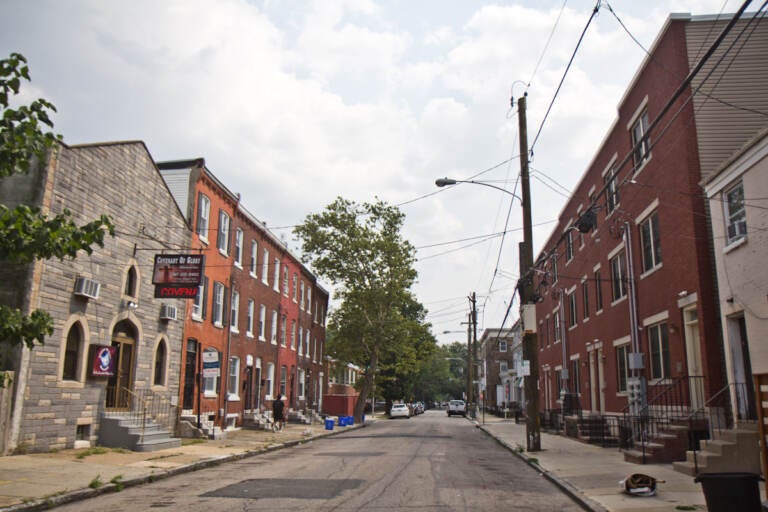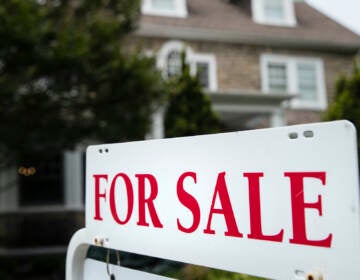Philly task force issues recommendations to eliminate home appraising bias
The long-standing problem is rooted in racial discrimination. Homes in primarily Black neighborhoods are undervalued by an average of nearly $26,000.

New housing (right) and old in Philadelphia’s Mantua neighborhood. (Kimberly Paynter/WHYY)
A task force convened by Philadelphia City Councilmember Cherelle Parker has released a set of recommendations aimed at eliminating home appraisal bias across the city, state, and country.
The long-standing practice is rooted in racial discrimination, and occurs when homes in primarily Black neighborhoods are valued less than comparable homes in primarily white neighborhoods. This potentially cheats families out of generational wealth, while also making it harder for homeowners to refinance or secure a mortgage for a more expensive house.
In Philadelphia, homes in primarily Black neighborhoods are undervalued by an average of nearly $26,000, according to Redfin. Anecdotally, gaps like these have led Black homeowners to “whitewash” their homes — remove family photos and other identifying objects — before a real estate appraisal in an effort to not lose out.
“It’s a form of bullying to me,” said Parker. “It makes me sick to my stomach.”
A report published this week by the Philadelphia Home Appraisal Bias Task Force charges the government at all levels to take action on the issue, which has remained somewhat ill-defined despite its time on housing advocate agendas.
There are calls to make the home appraisal industry more transparent, easier to break into for women and people of color, and more defined by knowledge of local markets — something task force members say is often missing from the appraisal process.
The report’s recommendations are also focused on having better appraisal data, more training for the appraisers themselves, and more targeted education for homebuyers, homeowners, and appraisers alike.
The hope is to make Philadelphia a national model for tackling the issue.
“It’s not just about fixing Philadelphia’s problem. It is about fixing Philadelphia’s problem and trying to create a movement around it that would benefit the states and the entirety of the country,” said Ira Goldstein, who chairs the task force in addition to his duties as president of the policy solutions group at the Reinvestment Fund.
While the specific causes of home appraisal bias are not well-known, there are some widely-accepted contributors, including the demographics of the appraisers.
In Philadelphia, 95% of appraisers are white. The vast majority are men. And most of them live in the suburbs, according to the report.
In response, the task force has made a variety of recommendations. At the local level, the group wants to see the city provide funding and support to neighborhood groups to generate promotional brochures and hold in-person information sessions so appraisers can learn about neighborhood assets and amenities.
At the state level, the task force is recommending that lawmakers in Harrisburg pass legislation that imposes specific fair housing training requirements on appraisers, similar to what’s seen in New York, California, and Ohio. There’s also a call for the state to review its rules and regulations for becoming an appraiser. For example, Pennsylvania requires 1,500 hours of training under a licensed appraiser, a total that presents a “significant roadblock” to diversifying the industry, according to the report.
“It was the sentiment of the people on the task force that those extra hours didn’t necessarily translate into better appraisers and was another hurdle for people to overcome to get into the profession,” said Goldstein.
The task force’s report also includes recommendations that seek to empower homebuyers and homeowners so they’re in a position to know when a home appraisal is low, and push back on the value. At the local level, the group wants the city to “develop and proactively distribute” materials that detail the appraisal process and consumer rights.
The thread running through the entire report is the need to have more data that could help better define appraisal bias. City Council, said the task force, needs to pass legislation that would require Philadelphia to collect appraisal information for all residential real estate transactions. This would include information about the appraiser, the appraisal itself, and the value of three comparable properties.
Additionally, the group wants the state to monitor, track, and report appraisal issues. Members want the federal government to require the disclosure of appraisal information, including the race of the owner and buyer. Similar to the way lenders must disclose mortgage information, the data could be used by city officials and state regulators to examine appraisal practices.
The Philadelphia Home Appraisal Bias Task Force began meeting last June. It consists of 22 members, including real estate agents, government officials, appraisers, and fair housing advocates — at the city, state, and national levels. The group was originally formed with the goal of having a “limited lifespan” of about a year.
“That said, the work is not done and there is energy expressed around future meetings to ensure that people remain engaged in the issue, and that local experience can inform state and national policymakers. Task Force members also expressed interest in using future meetings to encourage the implementation of the recommendations contained herein,” reads the first section of the report.

Get daily updates from WHYY News!
WHYY is your source for fact-based, in-depth journalism and information. As a nonprofit organization, we rely on financial support from readers like you. Please give today.









